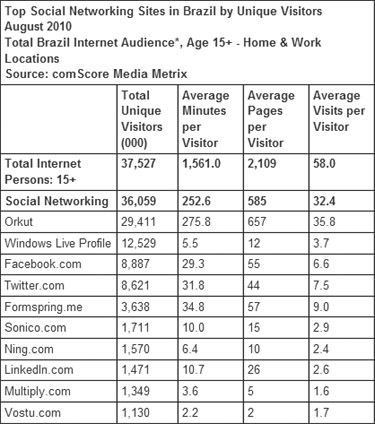comScore, Inc. (NASDAQ: SCOR) has just released a report on Twitter’s explosive growth worldwide. The comScore study found that in June 2010, about 93 million Internet users visited Twitter.com. This is an overall increase of 109 percent over last year. Indonesia reported the highest number of users, with 20.8 percent of Internet users in Indonesia visiting Twitter.com in June of 2010, followed by Brazil and Venezuela. Venezuela’s growth fueled in large part by Venezuelan President Hugo Chavez’s decision to join Twitter in late April 2010. This just goes to show that if you do not have a Twitter social media account for you or your business, then you need to set one up right away.

In June 2010, about 93 million unique global users age 15 and older visited Twitter from a home or work location. This is an increase of 109 percent from last year of June 2010. Keep in mind that this data excludes usage of Twitter-based applications such as TweetDeck and Hoot Suite.
An analysis by comScore of the five major global regions revealed that Latin America experienced the strongest audience growth, surging 305 percent to 15.4 million users. Asia Pacific ranked as the second-fastest growing region, climbing 243 percent to 25.1 million visitors. The Middle-East Africa jumped 142 percent to 5 million visitors, while Europe soared 106 percent to 22.5 million visitors. North America, where Twitter has reached a higher maturity level than other regions, saw a growth of 22 percent to nearly 25 million visitors in June.
Here are the numbers from comScore:

Visitation to Twitter.com by Global Regions
-------------------------------------------
June 2010 vs. June 2009
------------------------
Total Audience, Age 15+ -Home & Work
Locations*
------------------------------------
Source: comScore Media Metrix
-----------------------------
Unique Visitors (000)
---------------------
Jun-09 Jun-10 % Change
------ ------ --------
Worldwide 44,520 92,874 109
--------- ------ ------ ---
Latin America 3,792 15,377 305
------------- ----- ------ ---
Asia Pacific 7,324 25,121 243
------------ ----- ------ ---
Middle East -
Africa 2,058 4,987 142
------------- ----- ----- ---
Europe 10,956 22,519 106
------ ------ ------ ---
North America 20,390 24,870 22
------------- ------ ------ ---
*Excludes visitation from public computers such as Internet cafes or access from mobile phones or PDAs.
Across the 41 individual countries currently reported by comScore, Indonesia at 20.8 percent had the highest proportion of its home and work Internet audience visiting Twitter.com. Brazil ranked second with 20.5 percent penetration, followed by Venezuela at 19.0 percent. With Venezuelan President Hugo Chavez joining Twitter in late April, Twitter.com penetration in the country spiked 4.8 percentage points in a few short months. The Netherlands (17.7 percent) and Japan (16.8 percent) rounded out the top five, while countries in Latin America and Asia Pacific represented many of the remaining top markets, including the Philippines (14.8 percent), Mexico (13.4 percent) and Singapore (13.3 percent).
Top 20 Markets by Twitter Penetration
-------------------------------------
June 2010
---------
Total Audience, Age 15+ -Home & Work
Locations*
------------------------------------
Source: comScore Media Metrix
-----------------------------
Location % Reach
-------- -------
Worldwide 7.4
--------- ---
Indonesia 20.8
--------- ----
Brazil 20.5
------ ----
Venezuela 19.0
--------- ----
Netherlands 17.7
----------- ----
Japan 16.8
----- ----
Philippines 14.8
----------- ----
Canada 13.5
------ ----
Mexico 13.4
------ ----
Singapore 13.3
--------- ----
Chile 13.2
----- ----
United States 11.9
------------- ----
Turkey 11.0
------ ----
United Kingdom 10.9
-------------- ----
Argentina 10.5
--------- ----
Colombia 9.6
-------- ---
South Korea 9.3
----------- ---
Ireland 8.4
------- ---
India 8.0
----- ---
Malaysia 7.7
-------- ---
New Zealand 7.5
----------- ---
*Excludes visitation from public computers such as Internet cafes or access from mobile phones or PDAs.
What’s interesting is that an analysis of Twitter usage via mobile for the six mobile markets currently reported by comScore (U.S., U.K., France, Germany, Spain and Italy) revealed that Twitter is gaining adoption among smartphone users. In the U.S., 8.3 percent of smartphone users (4.2 million people) accessed Twitter.com in a month via the browser on their mobile devices, outpacing each of the European markets. In Europe, 2.8 percent of smartphone users overall accessed Twitter.com (1.7 million users), with the U.K. experiencing the strongest penetration in the region at 5.8 percent, followed by Germany with 3.1 percent and France with 2.1 percent.
Twitter Penetration Among Mobile
Smartphone Users*
3 Month Avg. Ending June 2010
Total Audience Age 13+
Source: comScore MobiLens
-------------------------
Twitter % Reach of
Audience Smartphone
(000) Users
-------- -----------
United States 4,246 8.3
------------- ----- ---
Europe 1,681 2.8
------ ----- ---
United
Kingdom 793 5.8
-------- --- ---
Germany 322 3.1
------- --- ---
France 173 2.1
------ --- ---
Spain 165 1.5
----- --- ---
Italy 227 1.4
----- --- ---
*Includes only mobile browser access to Twitter and does not include other Twitter-based mobile applications.
comScore says that “For applications such as Twitter that function as an instantaneous broadcast medium, the mobile device represents the ideal platform to engage with this content anytime and anyplace,” added Mr. Mudd. “The advanced web browsing features of smartphones enable this behavior, making it likely to accelerate as these devices gain continued adoption. While desktop-based Internet usage is still king, mobile web usage is surging on a global scale placing applications like Twitter at the forefront of that paradigm shift.”
Comments






 So it sounds like everything is on schedule and going according to plan. That’s good news for both companies, and for their users and investors. (Remember, Yahoo in particular thinks this deal will save it money, meaning the sooner the transition process is completed, the better.)
So it sounds like everything is on schedule and going according to plan. That’s good news for both companies, and for their users and investors. (Remember, Yahoo in particular thinks this deal will save it money, meaning the sooner the transition process is completed, the better.)
 Google appears to be suffering something of a losing streak with Orkut. Consider that comScore recently indicated the network
Google appears to be suffering something of a losing streak with Orkut. Consider that comScore recently indicated the network 


